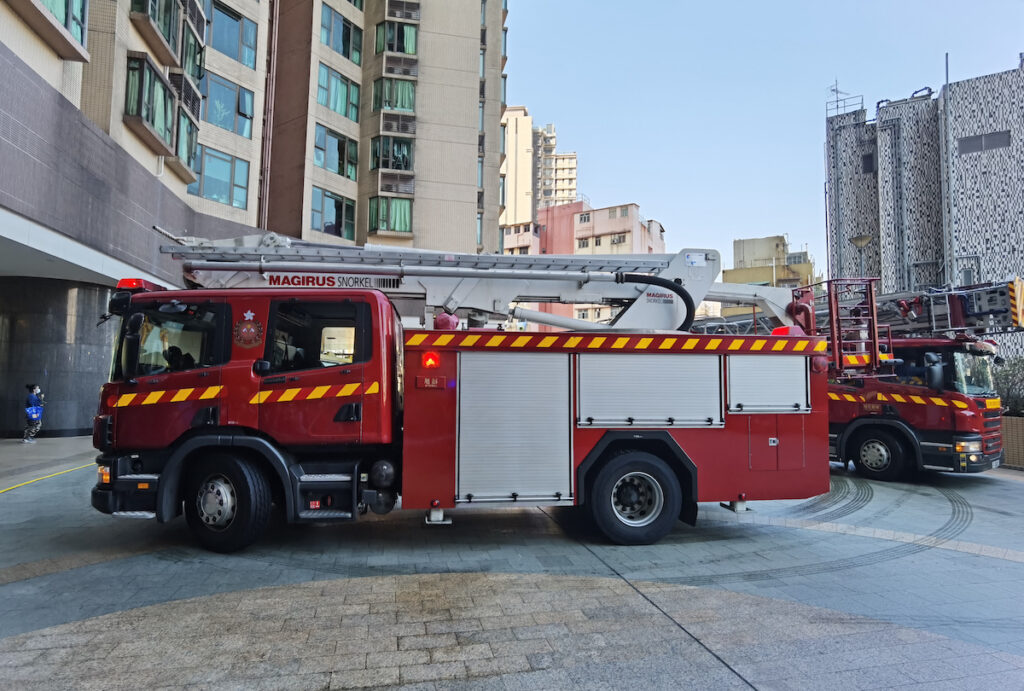
The UK National Health Service has reported a significant increase in mental health first-response calls (MIND, 2020). Police spend approximately 40% of their time responding to mental health crises (Kane et al, 2018). However, first-responders have reported being under-trained in supporting people in a mental health crisis (Kane et al, 2018). People who have experienced mental health crises have also reported being dissatisfied with first-response care (Holmes, 2017). A systematic review could corroborate evidence on how to best respond to people in mental health crises, thereby providing a resource for first-responders to read and learn from.
Dr Penny Xanthopoulou, a research fellow in psychology, led a systematic qualitative review. Their aim was: “to review available qualitative evidence on the subjective experiences of people with lived experience, their companions and FRs (first responders), of the FR response to mental health crises in the community.”

First responders are among the first to arrive and provide assistance at the scene of an emergency. They typically include police officers, paramedics, emergency medical technicians, and firefighters.
Methods
Systematic reviews involve systematically collecting relevant research studies, aggregating their findings, possibly developing new findings, and pointing out evidence gaps (Clarke, 2011). In this case, the authors searched four large medical databases and used manual searches to locate relevant literature. The authors used three major search criteria: mental health community, non-mental health emergency responders, and qualitative design (including mixed methods).
The authors double-screened relevant studies, assessed their quality, and extracted methodological information. The results of each study were then coded using inductive thematic synthesis. The authors followed a descriptive approach to summarise existing evidence rather than provide new interpretative themes. Their approach included: (i) developing descriptive codes for each sentence in the included studies analysis section; (ii) grouping similar codes into descriptive themes to describe similar findings in each study. Analysis was iteratively discussed with all authors.
Results
Seventy-nine studies were included in the synthesis, and the authors developed four descriptive themes. The descriptive themes are summaries of the findings of included studies. Each theme is summarised below.
Acknowledging versus criminalising mental illness and procedural concerns
This theme shows the contrast between police’s perception that restraints are appropriate when visiting someone in a mental health crisis and people’s and paramedics’ perception that restraint can cause extra distress and confusion. A Holmes (2017) study participant said: “You’re confined in this tiny, small box, and you go, ‘what’s happening to you?’ They don’t speak to you, and the only time they do, they’re barking orders at you.” A police worker in Canada et al.’s (2012) study said, “[physical restraint is] most helpful because they immediately make the situation unpleasant for the individual.”
A focus on de-escalation and reassurance was described as helpful in crisis care. Participants valued ‘active listening’ in which first responders gave people open space to discuss their mental health without interruption or threatening body language (e.g., not folding arms). A paramedic in White et al.’s (2019) study said: “The less you say, and the more you listen, the better the call will go… do you actually need to obtain that information or is it just agitating.”
Impact of perceived legitimacy and public stigma
This theme describes how some first responders stigmatised mental health crises. People experiencing mental health crises described their symptoms as frightening and needing medical intervention. By contrast, some first-responders described mental health crises as a waste of public resources and service time. A paramedic in Tully and Smith’s (2015) study said: “Next time you have the urge to pretend to kill yourself, do not call us, call someone who can help. Because while we are pampering to your selfish needs, there are others who really do need our help who are not getting it.” Not all first-responders stigmatised mental health crises. A police officer in Schulenberg’s (2016) said: “Just because we’re cops doesn’t mean we’re better than them… would you be angry with him if he had cancer?”
First responder capability and skills dealing with mental health crises
First responders experienced difficulties, including a lack of time, services, training, and knowledge when supporting someone in a mental health crisis. Most police said that when people could not be hospitalised, their only options were doing nothing or arresting them for ‘breach of the peace.’ A police officer in Livingston et al.’s (2014) study said: “training makes it look straightforward and it’s dead simple…and then you go out, and it’s just a different game.”
First-responders generally asked for more evidence-based guidelines and training for supporting people in a mental health crisis. First-responders who had training said they felt more confident. Training also helped challenge first responders’ prior assumptions regarding mental health. A police officer in Hanafi et al.’s (2008) study said: “After you come out of training, you understand that it’s an illness that’s treatable and that, you know, just normal people can suffer from a mental illness.’
Impact of response on companions: involvement hindering versus facilitating response
This theme explores how friends and family of people in crisis or ‘companions’ described feelings during the first response. Companions described feeling scared about what would happen to the person in crisis. This added to their own mental distress. A participant in Brennan et al.’s (2016) said: “No one would ring me up and talk to me. Here I was, a mother in crisis because her son [was in] crisis.”
When involved in mental health recovery, companions were described as an important and useful tool. In White et al.’s study, a paramedic said: “The family can be very instrumental in helping.”

Some first-responders in this research described mental health crises as a waste of public resources and service time. This may be illustrative of the stigma towards mental health.
Conclusions
The authors concluded:
This review demonstrates the variety of experiences and complexity of responding to a mental health crisis and the many diverse challenges first responders face.
Such challenges included supporting individuals in crisis and keeping their friends/family informed. This study highlights the importance of developing evidence-based training/resources for first-responders who respond to mental health crises.

Future research could develop evidence-based training and resources to support first-responders professional development and address this knowledge gap.
Strengths and limitations
The study was published in the British Medical Journal Open (BMJ Open), a journal with a reputation for publishing high-quality, rigorous, well-written studies that address gaps in evidence and give clear implications to clinicians and policymakers. Publication in the BMJ Open makes the study accessible to everybody with internet access. Searching multiple databases alongside manual searches helped the authors find relevant studies. The study was motivated by data gathered from public engagement. Public engagement can signify high-quality research as it transforms research into something done ‘for’ people rather than ‘with’ people (Pham, 2016).
However, the authors conducted a descriptive thematic synthesis. It is unclear whose method they followed, which may reduce the dependability of their results (Lincoln and Guba, 1985). Although descriptive approaches to qualitative analysis are acceptable, they are not the gold standard. Synthesises are different from narrative and systematic literature reviews in that they should make some effort to ‘go beyond’ (Strike and Posner, 1983). Developing a higher-order theme with new interpretations may have enhanced this study’s depth and methodological rigour.
Studies only in English were included. Therefore, the results may be less transferable (Lincoln and Guba, 1985). The authors acknowledged this limitation, but it was addressed in terms of generalisability. Quantitative language should not be used to assess the quality of qualitative studies. Qualitative research aims to explore people’s experiences in-depth, not to generalise. This is not a limitation of qualitative research, but simply one of its features.
Implications for practice
The authors suggest that more training, resources, and expertise are needed in first-response care for mental health crises. Providing access to appropriate and effective care, such as delivering care emphatically and with positive body language, may act as the first step to the individuals’ mental health recovery. With the individuals’ consent, utilising existing support networks like family and friends may also aid recovery.
Many first-responders explained that they are unsure how to support people in mental health crises. The presence of first-responders familiar with these situations could support the training of other first-responders. Skills could be shared during team meetings, continuing professional development, and ‘on the job.’ Undergraduate training must address how to attend to mental health crises. This training must be updated as further evidence-based training and resources are developed.

The presence of experienced first-responders in mental health crises could improve care and facilitate clinician training.
Samaritans are open 24 hours a day, 365 days a year. You can call free anytime, from any phone on 116 123. Alternatively, you can text SHOUT to 85258 to text someone anonymously at any time of the day.
Statement of interests
None.
Links
Primary paper
Xanthopoulou P., Thomas C., & Dooley J. Subjective experiences of the first response to mental health crises in the community: a qualitative systematic review. BMJ Open. 2022 Feb 3;12(2):e055393. doi: 10.1136/bmjopen-2021-055393.
Other references
MIND (2020). Mind warns of ’second pandemic’ as it reveals more people in mental health crisis than ever recorded and helpline calls soar. Available: https://www.mind.org.uk/news-campaigns/ news/mind-warns-of-second-pandemic-as-it-reveals-more-peoplein-mental-health-crisis-than-ever-recorded-and-helpline-calls-soar/ [Accessed 20 Jun 2022].
Holmes L. (2017) “I Just Felt Like I Was in a Cage”: Examining the Accounts of Returned Missing Adults With Mental Health Issues. Illness, Crisis & Loss 2017;25:5–26.
Kane E, Evans E, Shokraneh F (2018). Effectiveness of current policingrelated mental health interventions: a systematic review. Crim Behav Ment Health 2018;28:108–19.
Clarke J. (2011) What is a systematic review? Evidence-Based Nursing 2011;14:64
Canada K E., Angell B., Watson AC. (2012) Intervening at the entry point: differences in how CIT trained and non-CIT trained officers describe responding to mental health-related calls. Community Ment Health J 2012;48:746–55
White C, Goldberg V, Hibdon J, et al. (2019) Understanding the role of service providers, land use, and resident characteristics on the occurrence of mental health crisis calls to the police. J Community Psychol 2019;47:1961–82.
Tully T, Smith M. (2015) Officer perceptions of crisis intervention team training effectiveness. The Police Journal 2015;88:51–64.
Schulenberg JL. (2016) Police Decision-Making in the Gray Zone:The Dynamics of Police–Citizen Encounters With Mentally Ill Persons. Criminal Justice and Behavior 2016;43:459–82.
Livingston JD, Desmarais SL, Verdun-Jones S, et al. (2014) Perceptions and experiences of people with mental illness regarding their interactions with police. Int J Law Psychiatry 2014;37:334–40
Hanafi S, Bahora M, Demir BN, et al. (2008) Incorporating crisis intervention team (CIT) knowledge and skills into the daily work of police officers: a focus group study. Community Ment Health J 2008;44:427–32.
Brennan A, Warren N, Peterson V, et al. (2016) Collaboration in crisis: carer perspectives on police and mental health professional’s responses to mental health crises. Int J Ment Health Nurs 2016;25:452–61.
Pham, D. (2016) Public engagement is key for the future of science research. NPJ Science Learn 1, 16010 https://doi.org/10.1038/npjscilearn.2016.10
Lincoln, Y. S., & Guba, E. G. (1985). Naturalistic inquiry. sage.
Strike K., & Posner G. (1983) Types of syntheses and their criteria. In: Ward S, Reed L, eds. Knowledge structure and use. Philadelphia: Temple University Press.
Photo credits
- Photo by taylor hernandez on Unsplash
- Photo by mauro mora on Unsplash

It’s clear from the article that first responders could receive more training, and I was horrified to read that one thought it a good idea to cause the individual to feel worse! However, I think you’ve got it right that their priority is containment for the public and their own safety – the mental health needs of some individuals complicate this situation. I can only imagine how undervalued some first responders might feel when politicians and the public do not recognise their efforts.